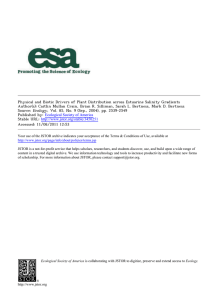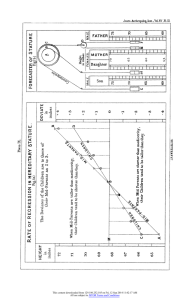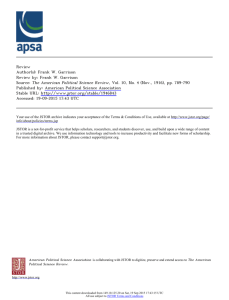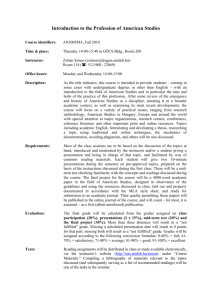Memory and Nostalgia as Music-Historical Categories Author(s): Leon Botstein Source:
advertisement
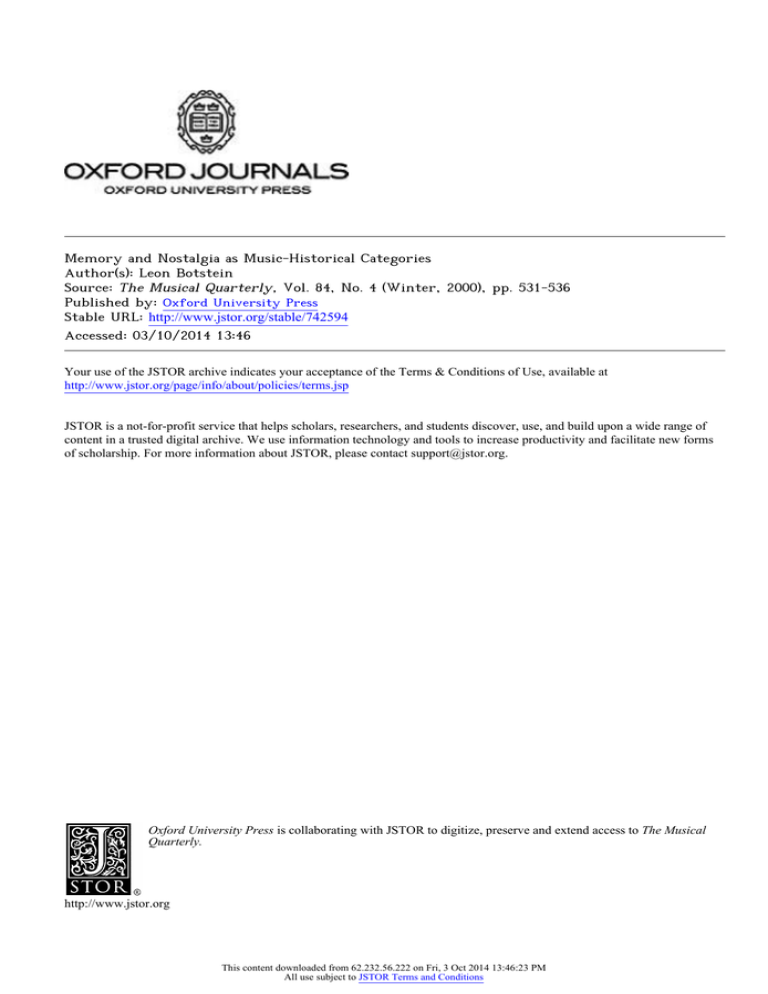
Memory and Nostalgia as Music-Historical Categories Author(s): Leon Botstein Source: The Musical Quarterly, Vol. 84, No. 4 (Winter, 2000), pp. 531-536 Published by: Oxford University Press Stable URL: http://www.jstor.org/stable/742594 . Accessed: 03/10/2014 13:46 Your use of the JSTOR archive indicates your acceptance of the Terms & Conditions of Use, available at . http://www.jstor.org/page/info/about/policies/terms.jsp . JSTOR is a not-for-profit service that helps scholars, researchers, and students discover, use, and build upon a wide range of content in a trusted digital archive. We use information technology and tools to increase productivity and facilitate new forms of scholarship. For more information about JSTOR, please contact support@jstor.org. . Oxford University Press is collaborating with JSTOR to digitize, preserve and extend access to The Musical Quarterly. http://www.jstor.org This content downloaded from 62.232.56.222 on Fri, 3 Oct 2014 13:46:23 PM All use subject to JSTOR Terms and Conditions Notes from the Editor and Nostalgia as Music-Historical Categories Memory LeonBotstein One of the dauntingchallengesthatfacethosewho workin the fields not onlyof musicanalysisandhistorybutalsoof socialandculturalhistoryis the questionof how the studyof music(not only musicalculture) of history.We continueto developclaims can expandourunderstanding andgeneralizations aboutthe pastwhosesourcesareliteratureand paintingas well as filmandvideotapemedia.When it comesto theater with music,opera,andmusicaltheater,suchsourcesareusedusually with an emphasison text andplot. Boththe run-of-the-mill textbook andthe moresophisticatedscholarlypaperwill usethe evidenceof the mannerto buttressorjustifya permusical,if at all, in a supplemental ceptionor generalassertionwhoseessentialoriginderivesfromlinguistic of the cultureandmoresof soand/orvisualsources.Ourunderstanding cietiesin the pastas represented the results of scholarlynarrationand by the selectionis rarelyinfluencedby useof musicas a primarysource. This is perfectlyunderstandable. In the firstinstance,thereis the firm that a distinction is to be madebetweenthe long-standing prejudice so-calledmusicalandthe extramusical. In this view,thereis a musical logicin all systemsof musicmaking,whethernotatedornot, whose properdescriptionandunderstanding requiresa commandof essential self-referential characteristics andthe presumedautonomouslogicof the acuteforlong-form, waysoundpassesthroughtime.This is particularly instrumental events of music. To understand musicas purely composed one history, needsto commandsomeplausibleknowledgeof musical logicandthen strugglewith describingit in language.Evenarmedwith suchskill,the observermayfindthe realmof correspondences between musical variables and extramusical linguisticallyexpressed meanings suddenlytenuousif not arbitrary exceptin rarehistoricalmoments,such as the late eighteenthcentury,whenone mightappealto a normative system of correspondencesbetween musicalrhetoric and sentiments. In the second instance, in historical termsone clearlyneeds to distinguish between the scriptor map of music (e.g., a printabletext) and the performedoccasion, the actual sound journey.In the age of sound 531 This content downloaded from 62.232.56.222 on Fri, 3 Oct 2014 13:46:23 PM All use subject to JSTOR Terms and Conditions 532 TheMusicalQuarterly by mechanicaldevicessuchas digitalrecordings(withor reproduction withoutvideo),the historicalevent identifiedas musiccanbe sounding musicthat is or can be repeatedin manycontexts.It canalsobe the traditionalpublicor privatemomentof musicperformed at a specificmomentandplace.Whatarethe differencesbetweenusinga musicaltext the musicrealizedin realtimeas the legitias evidenceandregarding matehistoricalresidue?The widevariationin the waya musicaltext can be realizedcomplicatesthismatterfurther.Buteven if we couldagree abouthow somethingmighthavesoundedandbeenplayedin the past, therearefurtherproblems.One needsto askthe historicalquestionof who waslisteningandwhattheyheard(orthoughttheyheard),in the senseof whattheirexperienceof listeningwasabout.Hereone encountersa problemposedby memoryin music.When one readsa book,for example,andthen is askedaboutwhatone hasread,the readercanthroughthe merepossessionof literacy-not onlyrecallbutadjustthat recallandlocateandconfirmmemoryusingthe text. The reader,just like the beholderof a painting,can returnto the text or objectand identifysitesof recall. Listenerswho areableto do thisformusichavesincethe midnineteenthcenturybeena decidedelite. Evenforthatelite of amateur musicianswho couldlinkwhattheyheardandplayedto a script,fora long timethe receptionof musicperformed by othersdependedon recollectionof eventsin elapsedtimesustainedpurelybymemory.Only in the laternineteenthcenturywoulda marginalnumberof listeners,in termsof the overallpercentage,locatein printedtexts (if andwhenthey Evenif we couldagreeon musicas it appeared)whattheyremembered. musthave soundedandfocuson thatmusicas actuallylistenedto or listenersremembered beheard,we wouldhave to askwhatin particular foreaskingaboutthe significance,if any,of the musicheard.The significanceof musicashistorymaybe not primarilyin the text butratherin the transactionbetweenperformer andlistener,even if we regardthe of listener. That transactioninvolvesthe asas one performer category criptionof meaningin listeningthat in turndependson the functionof musicalmemoryin a givenculture.The text itselfmaynot be helpfulall on its own. Thesemusingsaresomewhatakinto the questionposedin Walter Frisch'sdiscussionof Schubertin this issueof MQ as to who is doingthe His suggestionof an educatedlistenerwithcultivatedexremembering. pectations of what was likely to happen when listening to a quartetis perfectlyreasonable.But it is only one of many possibleanswersto the queryabout which of many listeners in the past one wants to know about. Another hypothetical listener could be the composerwho inscribesthe opportunityfor memorywithin a workfor himself, standing This content downloaded from 62.232.56.222 on Fri, 3 Oct 2014 13:46:23 PM All use subject to JSTOR Terms and Conditions MemoryandNostalgia 533 in ashis own ideallistener.One sometimesgetsthissensein Richard in his laterworkssuchas Diedgyptische Strauss(particularly Helena,Die whererecollection,self-quotation, LiebederDanae,andMetamorphosen), nuancedrepetition,andevocativegesturecapableof recall-often below the surface-maybe directednot so muchat anylistenerat all but at the conversationwith oneself. The groupof papersin this issueof MQ on Schubertandmemory suggestthatone wayin whichmusicmaybe privilegedand indispensableas a medium,andthereforeas morethana supplemental constituent of history,is as the activitywherebywe can discoverthe waysin which memoryandrecollectionhavefunctionedin the past.Forexample,it maywell be thatthe phenomenonwe identifyas nostalgiacan be best understoodas it is encodedthroughthe mediumof music.Nostalgiais of coursenot memory.One of its socialformsis as a facetof andstrategy withinculturalpolitics.Since at leastthe late eighteenthcentury,and from1815on, therehasbeenan ongoingcurrentin Europarticularly peanthoughtandcultureof the ideologyof nostalgia.The polemical sideof thisphenomenonhascontinuedunabatedto the presentday. Thereis no shortageof prophetsof culturalandmoraldeclinewhoseargumentsandworksof artarebasedon a suggestionandpresentationof betterdayslonggonewhosestatusis largelymythological.It is common in historicalaccountsof the mid-eighteenthcenturyin England,andthe earlynineteenthcenturyon the Continent,to identifyin literaryand culturalworksnostalgiafora preindustrial world.This is oftenlocatedin aresomeevocationsof landscapeandnature.Aspectsof neoclassicism times,butnot always,suffusedwith impliednostalgia,even whenthey are,as in Germanyin the 1820sor,morewidely,in Europein the 1920s, characterized by reformistaspirations. intensein the latenineNostalgiaas ideologybecameparticularly teenthcenturyin the decadesthatbroughtus MatthewArnoldandMax Nordau.The musicalstrategyutilizedby MaxBruchin his popularoratorioOdysseus from1872wasa consciousperiodictriggering of reminiscencewithinthe workthroughthe suggestionof Handel,Bach,Mendelssohn,andSchubert.Thesepointsof recollectionweredesignedto evoke andin the throughmusicalmemoryin the amateurchoralparticipants audiencea constructedsenseof a sharedculturalheritageanddefinition (explicitlyanti-Wagner, despiteusesof Wagneriangestures),an alternative notionof Germanculturalidentity.The two composersof the fin de siecle whose overt manipulationsof the possibilitiesfor nostalgia throughmusic within the listener'sexperience throughthe multiple applicationof the encounter with memoryin a musicalwork are most adventuresomeand complex are of courseGustav Mahler and Charles Ives. This content downloaded from 62.232.56.222 on Fri, 3 Oct 2014 13:46:23 PM All use subject to JSTOR Terms and Conditions 534 TheMusicalQuarterly Butin the twentiethcenturymattersbecameeven morecomplicated.Musicincreasingly waswrittento evokea sensibilityof lossfor a pastthatneitherlistenernorcomposercouldhaveexperiencedor known.Bart6kandSzymanowski expressaspectsof musicalnationalism the folk traditions and exotic,whoseconnectionto the lisby evoking teneris discontinuous. Thesetraditionsarethemselvesat bestreconstructions.Theirfunctionis to underscore not memorybutquitedistant lossandcontrastwith contemporary life,as wellas to definedistinctiveness.The effectivenessis dependenton an experiencethroughmusic that is plausibleonlyby the act of musicalhearingin whichmemory andassociationarerealizedthroughrecollectionwithinthe framework of the musicalevent.A comparable of memoryembedded manipulation in musiccanbe foundin the 1970s,as is evidentin the musicof Alfred Schnittkeandthe quitedistinctneoromanticvolte-faceof Krzysztof Penderecki. As the historianMartinJayhasargued,one can trace,particularly in the eighteenthandnineteenthcenturies,the historyof the notionof A versionof a nonrationalcategoryknownas experience,orErlebnis. this is FriedrichSchleiermacher's belief(echoedby Mendelssohnin his sacredmusicandsecularoratorios)thatby listeningto musican experience of God andthe divineunmediatedby languageandimage(and thereforemorepowerfulandcommunal)couldbe generated,both in This the individualandin an assemblyof listenersandparticipants. of thoughtfindsits apogeein Nietzsche'sBirthof Tragedy. trajectory Debussy,writingto RaoulBardac,his sometimepupilandlater stepson,comparedmusicfavorablyto paintingin its capacityto collect detailin termsof variationsof colorand and"centralize" impressions light.1AlthoughDebussyusedvisualanalogiesto specifythe superiority time."It of music,he conceivedof a workof musicas "rhythmicized couldcaptureandthereforeevokethe emotionlinkedto a human experienceinaccessibleto both the poetandthe painter.Experience, becomesunderstoodmorein as in the Germantraditionof Erlebnis, the mannerof HenriBergson.Consequentlyit is Debussywho realizes that throughmusicsilencecan be framedas one of its elements;this is criticsrecognized)in Pelliaset exploited(ascontemporary powerfully M lisande.2 We recognizethatwithinthe contextof familylife we all have a to help us to recollect.We alsoknowintutendencyto usephotography itively that listening to music, preciselybecauseit is a medium in time functioning in some mannerapartfrom verbalsignifiersor even visual correspondences,seems to evoke in a Proustianmannerthe sensibility of past experience. Music is particularlynoted, therefore,for its capacity This content downloaded from 62.232.56.222 on Fri, 3 Oct 2014 13:46:23 PM All use subject to JSTOR Terms and Conditions andNostalgia 535 Memory to generatean intensityin the unantici(in contrastto a photograph's) patedrecollection.Freud'smodestmusicality,if not extremeunmusicality,maybe one sourceof his failureto utilizemusicas a meansto justify andilluminatehis psychological of the unconscious. geography all this the What need to pressfurtherin the direction pointsto is that Frischandhis colleagueshavedonein theirdiscussionsof Schubert. If the remembering agentis the hypotheticalideallistenerintentionally the composer,then it is usefulto contrastFrisch'shypothesis positedby tiradesagainst memoryin a Schubertquartetwith Debussy's regarding the barriers erectedto experiencingthe uniquepowerof music.The anticipationof narrativemeaningsrepletewith the possibilityof crossreferentialrecall-the attributesof the listenerthatpermittedmemory viewresponsibleforthe parlous to workin Schubert-werein Debussy's stateof the listeningaudience.Debussyonce complainedto PaulDukas thatalthoughmusicwasthe finestmeansof humanexpression,in his own dayit hadbecome"devoidof emotionalimpact."The purposeof musicforDebussywasclearlyderivedfrombutbeyondthe Wagnerian: to emancipatethe listenerfromthe mundaneandthe everyday. The barrierto achievingthis experience,uniquelycommunicable by music,was musicwith an anticactuallythe well-schooledlistenerwho approached of and as and, Debussyderisivelyput ipation form,structure, procedures Schubert'slistenerbeit, subjectedmusicto a "symphonic treatment.'"3 comesDebussy's bete-noire.Memoryin musichadbecomereducedto narrativeandform.Debussysucceeded.His musicin particular evokesin somelistenersspecificmemoriesof place,light,andfeelingof pastexperiencesunintentionallylinkedto anypresumedlogicof the composition. One can see fromthis comparison thatneitherlisteningnorthe historicalfunctionof musicis a normativeanalyticor descriptivecategory.Butin exploringboth intentionalityon the partof the composer andthe documentedhistoricalexperienceof listening,the consideration of musicas the mediumby whichindividualsandgroupsexperienced anddealtwith memoryandrecollectionshouldbe a priority.The texts of musicleft to us arearcheological fromwhichwe can reconfragments structthe historicalexperienceof music,the patternsandobjectsof presumedmemory,andthe essentialcontentof culturalnostalgia.Music,in its particular linksto the facultyof memory,becomesan obliquerouteto findingout how culturesdealtwith entropyas reflectedin the passageof time;forhumans,that is nothinglessthanthe presenceandinevitability of death. The neurobiologyand psychologyof memory,as well as recent researchin the uncanny links between the physiologicalfunction of eye and ear, may help us focus furtherresearch.As historianswe would do well to look more closely at comparisonsbetween listening, musical This content downloaded from 62.232.56.222 on Fri, 3 Oct 2014 13:46:23 PM All use subject to JSTOR Terms and Conditions 536 TheMusical Quarterly time, musicalform, and thinking in wordsand images,particularlyas they are connected to the uses of personaland collective habits of memory.This line of investigationmay permitstudentsof music not only to revise the standardnarrativeof the past, but, further,to illuminatethe continuities between past and present.The historical inquiryinto music'sfunction may help us refinethe ongoing presumptionthat the purpose of historical researchis the disaggregationof the narrativeof human experience and the reconstructionand assertionof ever-expanding differentiations. Notes 1. SeeFran•ois Lesure andRogerNichols,eds.,Debussy transl.RogerNichols Letters, Faber andFaber, (London: 1987),166. 2. SeeLesure andNichols,56. andNichols,117-18. 3. SeeLesure This content downloaded from 62.232.56.222 on Fri, 3 Oct 2014 13:46:23 PM All use subject to JSTOR Terms and Conditions
